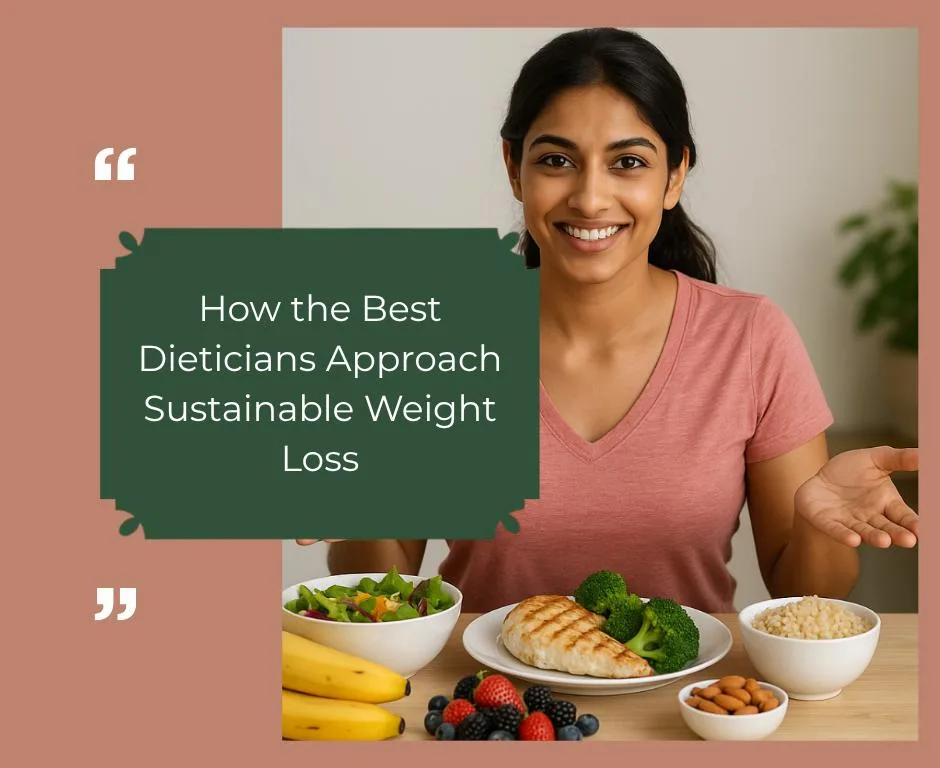Losing weight is easy to promise but hard to sustain. Quick fixes and crash diets may show short-term results — but lasting change requires a smarter approach. The best dieticians don’t chase trends; they design evidence-based, individualized plans that help you lose weight and keep it off for good.
At The Health Studio by Richa Doshi, we focus on sustainable strategies that respect your lifestyle, preferences, and health history. In this article, reviewed by Dietician Richa, we’ll break down how top dieticians design programs that deliver real, long-term results.
Why Most Diets Fail (and What Experts Do Differently)
Many diets fail because they’re rigid, unrealistic, or nutritionally poor. The result: initial weight loss followed by rebound gain and frustration. Leading dieticians avoid these traps by prioritizing:
- Personalization — plans shaped by your medical profile, activity level, and food preferences.
- Sustainability — strategies you can follow for months and years, not just weeks.
- Behavior change — building habits, not handing out rules.
This mindset shift is what separates a short-lived diet from a lifelong transformation.
Step 1 — Comprehensive Assessment Before Any Plan
Top dieticians begin with a thorough assessment. This usually includes:
- Medical history (thyroid, diabetes, PCOS, past surgeries)
- Current medications and supplements
- Eating patterns and food preferences (cultural or religious restrictions)
- Activity levels and daily routine
- Sleep, stress, and mental health screening
- Baseline anthropometrics (weight, waist circumference, body composition if available)
A tailored plan based on this assessment is far more effective and safer than a generic calorie chart.
Step 2 — Realistic, Science-Based Goal Setting
Instead of promising dramatic short-term weight loss, expert dieticians set realistic, measurable goals such as:
- 0.5–1 kg per week (healthy and sustainable)
- Improved energy or sleep within 3–4 weeks
- Reduced waist circumference and better lab markers (HbA1c, lipid profile) over months
The focus is on gradual progress — small wins that compound into long-term success.
Step 3 — Flexible, Food-First Plans (Not Restrictive Diets)
The best plans are flexible and enjoyable. Rather than banning foods, dieticians teach portion control, smarter swaps, and meal timing. Typical elements include:
- Balanced macronutrient distribution (adequate protein, moderate healthy fats, controlled carbs)
- Low glycemic index carbohydrate choices to stabilize blood sugar
- Inclusion of favorite foods in measured portions to avoid deprivation
- Practical meal prep tips for busy schedules
This pragmatic approach improves adherence and reduces the chance of binge-eating or dropouts.
Step 4 — Behavior Change & Habit Building
Sustainable weight loss is 80% behavior. Top dieticians use techniques from behavioral science:
- Small habit stacking (e.g., add a vegetable to every meal)
- Cue-routine-reward mapping to replace unhealthy patterns
- Self-monitoring with food logs, apps, or simple trackers
- Relapse planning so clients know how to recover from slip-ups
These tools create a resilient lifestyle, not a fragile “diet” that breaks under stress.
Step 5 — Regular Monitoring and Smart Adjustments
Weight-loss plans must evolve. Experts schedule follow-ups to:
- Track progress and troubleshoot plateaus
- Recalculate energy needs as weight changes
- Adjust macronutrients and meal timing for better satiety
- Review lab tests (thyroid, lipids, glucose) to optimize health outcomes
At The Health Studio by Richa Doshi, clients benefit from structured check-ins that keep momentum steady and goals realistic.
Step 6 — Addressing Underlying Medical & Hormonal Issues
Sustainable weight loss often requires managing medical factors that impede progress:
- Thyroid dysfunction — treated medically and managed nutritionally.
- Insulin resistance or PCOS — needs low-GI meals, regular protein, and weight-targeted interventions.
- Sleep apnea or chronic stress — both affect appetite hormones and metabolism.
A top dietician coordinates with doctors, ensuring weight-loss plans are safe and medically appropriate.
Step 7 — Lifestyle Integration: Movement, Sleep & Stress
Diet works best when paired with lifestyle adjustments:
- Moderate daily activity (30–45 minutes) and strength training to preserve muscle
- Sleep hygiene to normalize appetite-regulating hormones (ghrelin/leptin)
- Stress-management (meditation, breathing, counseling) to lower emotional eating
This 360° approach makes weight loss durable and life-enhancing.
Practical Strategies Top Dieticians Use
- Protein-first breakfasts to curb mid-day cravings.
- Plate method (½ vegetables, ¼ lean protein, ¼ complex carbs) for easy portion control.
- Mindful eating: no screens, slow chewing, and hunger/fullness checks.
- Meal prep templates to reduce decision fatigue.
- Flexible “treat” windows to permit occasional indulgences without derailing progress.
These tactics are simple, evidence-based, and effective.
Expert Insights — Reviewed by Dietician Richa
According to Dietician Richa, founder of The Health Studio by Richa Doshi:
“Sustainable weight loss is less about strict rules and more about creating a life you can live in. I focus on habit-driven changes, improving metabolic health, and realistic meal plans that respect culture and taste. That’s why people stick to the plan — and keep the weight off.”
Her programs combine clinical assessment with practical coaching to support real people in busy lives.
FAQs (Schema-Friendly)
Q1: How much weight can I safely lose per month?
A healthy rate is 2–4 kg per month depending on starting weight, metabolic health, and adherence.
Q2: Are cheat days allowed in a sustainable plan?
Yes — when planned and portioned; they help with adherence but should not become frequent binges.
Q3: What happens if I hit a weight-loss plateau?
Top dieticians reassess energy intake, macronutrient balance, activity, sleep, and stress, then adjust the plan accordingly.
Q4: Can I lose weight while breastfeeding?
Yes, with a dietician-supervised plan that ensures adequate nutrition for milk production while promoting gradual weight loss.
Q5: Are online dietician consultations effective?
Absolutely — with structured follow-ups, tracking tools, and personalized plans, online support can be as effective as in-person sessions.






